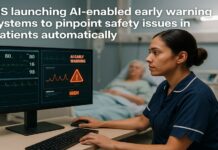A pioneering scanning device can instantly reveal an individual’s risk of type 2 diabetes through a non-invasive fingernail reading, according to the results of two new studies published at the American Diabetes Association (ADA) annual meeting on 24 June 2023.
The Glyconics-DS TM device – which is similar in size to a mobile phone – offers an instant needle-free alternative to the traditional diabetes blood test. Affordable, portable and environmentally sustainable, it enables large-scale screenings for diabetes in any location, eliminating the need for participants to travel to a healthcare establishment. This is especially pertinent in more resource limited healthcare settings.
The two independent pilot studies – conducted in different countries (UK and Spain), contrasting healthcare settings and across diverse populations – demonstrated outstanding results, with the novel device proving greater than 95% accuracy when identifying people at no immediate risk of diabetes.
This means they were below the diagnostic marker for diabetes risk. The novel device works by utilizing an infrared beam to assess sugar levels which store in the fingernail, and takes just seconds to assess the user’s diabetes risk as ‘normal’ or ‘elevated’.
The needle-free device additionally eliminates the reliance on single-use plastics, reducing waste to zero.
Dr Päivi Maria Paldánius, Chief Medical Officer, Glyconics, added: “Globally, there are 530 million people living with diabetes. That’s one in 10 adults. And yet, for every person with a diagnosis, there are up to three more people living with an undiagnosed condition.The only way we can properly protect people from the disease, which can have devastating complications in later life, is by developing sustainable, affordable and pragmatic approaches to mass screening. Instant results enable people at risk to make essential lifestyle changes and be aware of their personal risk.”
Dr Pratik Choudhary, Professor and Honorary Consultant in Diabetes at the University of Leicester and Leicester Diabetes Centre – who was lead investigator of the Leicester-based study in the UK – said: “Now we can finally address global inequalities in health and thus identify the millions with undiagnosed diabetes, especially in resource constrained countries. It has also been important to conduct this study in Leicester where screening within our ethnically diverse population is essential for management of diabetes risk and early prevention”.
Prof Xavier Cos, Chairman of Primary Care Diabetes Europe and Associate Professor of Medicine at the Autonomous University of Barcelona and the Sant Martí primary care centre, Catalonian Health Institute in Barcelona – who was lead investigator of the study in Spain – said: “Developing non- invasive systems for population-level screening will be an important tool in changing the paradigm of screening by reducing current barriers and identifying people at risk early. Early detection and treatment, which are key to better long-term outcomes, require more attention: This exciting new approach will shape the pivotal role that primary care plays in the management of diabetes and its long-term outcomes.”
Dr. Kam Pooni, Chief Executive, Glyconics, said: “The team at Glyconics is incredibly excited about the potential impact this product will make in transforming diabetes screening and improving accessibility to vital healthcare information.”
In anticipation of regulatory approval, a pivotal study is scheduled later this year to further validate the performance of Glyconics-DS TM and its associated software.

















